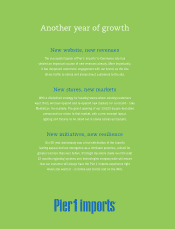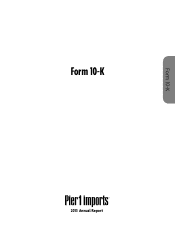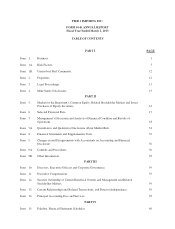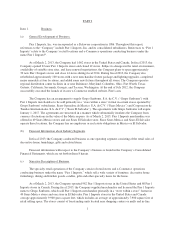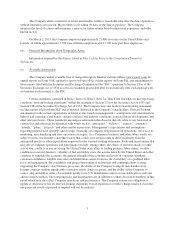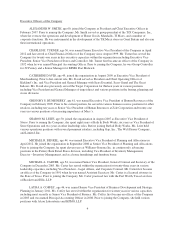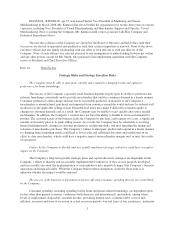Pier 1 2013 Annual Report Download - page 12
Download and view the complete annual report
Please find page 12 of the 2013 Pier 1 annual report below. You can navigate through the pages in the report by either clicking on the pages listed below, or by using the keyword search tool below to find specific information within the annual report.weather, tax rates and rate increases, consumer confidence in future economic conditions and political conditions
(including the possibility of a governmental shut down), and consumer perceptions of personal well-being and
security. Unfavorable changes in factors affecting discretionary spending could reduce demand for the
Company’s products and therefore lower sales and negatively impact the business and its financial results.
The Company outsources certain business processes to third-party vendors and has certain business
relationships that subject the Company to risks, including disruptions in business and increased costs.
The Company outsources some business processes to third parties including gift card tracking and
authorization, credit card authorization and processing, store scheduling and time and attendance, store
maintenance services, maintenance and support of the Company’s website and e-Commerce platform, certain
marketing services, insurance claims processing, customs filings and reporting, ocean freight processing,
shipment and delivery of e-Commerce orders, certain payroll processing and various tax filings, record keeping
for retirement plans, and third party vendor auditing. In addition, the Company also has business relationships
with third parties to provide essential services such as the extension of credit to its customers and maintenance of
the Company’s private-label credit card and rewards program. The Company makes a diligent effort to ensure
that all providers of these services are observing proper internal control practices, such as redundant processing
facilities; however, there are no guarantees that failures will not occur. Failure of third parties to provide
adequate services or the Company’s inability to arrange for alternative providers on favorable terms in a timely
manner could have a negative effect on the Company’s financial results.
An overall decline in the health of the United States economy and its impact on consumer confidence and
spending could negatively impact the Company’s results of operations.
The recession experienced by the United States in recent years resulted in a significant decline in the
market value of domestic and foreign companies, adversely affecting the savings and investments of United
States consumers. The resulting deterioration in consumer confidence and spending during that recessionary
period resulted in consumers sacrificing purchases of discretionary items, including the Company’s merchandise,
which negatively impacted the Company’s financial results during those years. Such a recession could occur
again and could have a similar, if not worse, impact on the Company’s financial results.
Failure to control merchandise returns could negatively impact the business.
The Company has established a provision for estimated merchandise returns based upon historical
experience and other known factors. If actual returns are greater than those projected by management, additional
reductions of revenue could be recorded in the future. Also, to the extent that returned merchandise is damaged,
the Company may not receive full retail value from the resale of the returned merchandise. Introductions of new
merchandise, changes in merchandise mix, associate selling behavior, merchandise quality issues, changes to the
Company’s return policy, e-Commerce return behavior, changes in consumer confidence, or other competitive
and general economic conditions may cause actual returns to exceed the provision for estimated merchandise
returns. An increase in merchandise returns that exceeds the Company’s current provisions could negatively
impact the business and financial results.
A disruption in the operation of the domestic portion of the Company’s supply chain, including the
e-Commerce business, could impact its ability to deliver merchandise to its stores and customers, which could
impact its sales and results of operations.
The Company maintains regional distribution centers in Maryland, Ohio, Texas, California, Georgia and
Washington. At these distribution centers, merchandise is received, allocated, and shipped to the Company’s
stores, and/or e-Commerce orders are fulfilled. Major catastrophic events such as natural disasters, fire or
flooding, malfunction or disruption of the information systems, a disruption in telephone/internet service or
6


